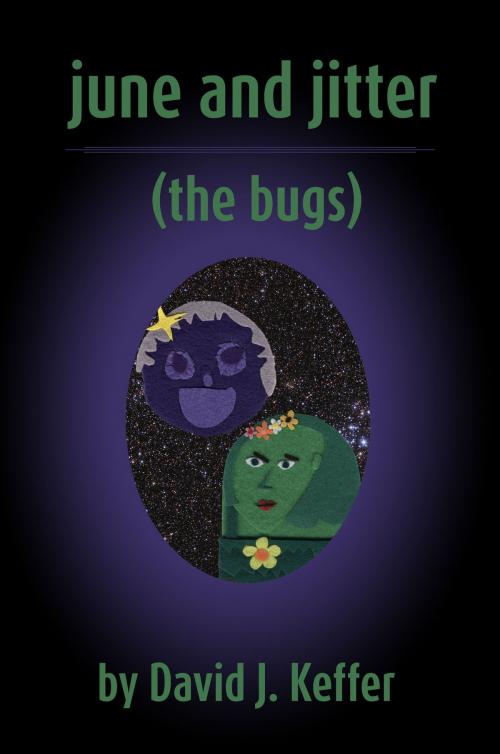| Author: | David Keffer | ISBN: | 9781301992317 |
| Publisher: | David Keffer | Publication: | July 25, 2013 |
| Imprint: | Smashwords Edition | Language: | English |
| Author: | David Keffer |
| ISBN: | 9781301992317 |
| Publisher: | David Keffer |
| Publication: | July 25, 2013 |
| Imprint: | Smashwords Edition |
| Language: | English |
"June and Jitter (the bugs)" can most succinctly be described as the bastard child produced from the unholy union of Ray Bradbury's "The Martian Chronicles" and an unrelenting dose of the clinical absurdism of Kobo Abé. A crew of ten leave Earth to explore the planet, Simuliidae, but only one of them is aware that the planet is already inhabited by a race of aliens, known as June, driven insane by an ancient, sentient and telepathic moon, conveniently also named June, June the Moon. These explorers struggle to come to terms with the cosmic and potentially self-destructive message that June directs them to scrawl across the face of Simuliidae.
"June and Jitter (the bugs)" is unabashedly a manifesto of meaninglessness, poorly disguised in the garb of a science fiction novel. When a reader considers devoting some portion of their time to exploring meaninglessness, they must first grapple with the question of what is to be gained by this investment of time and effort. What fruits of education or entertainment can be harvested from a book, which describes the downfall of the legendary mortician, Ronald McDonald, at the hands of his accomplice in the necromantic arts, Grimace, whose skin is purple with bruises and who is said to embody the incarnate virtues of Aphrodite? What esoteric knowledge can be gleaned from learning the truth behind the mysterious encapsulation of the sage Baba Rama in a refrigerator by the trio of meddling teens, Fred, Velma and Daphne? When one understands that the world is populated exclusively by people who can be categorized as jackanapes, mountebanks and blackguards, does it make the task of living up to one's expectations for oneself any easier? Of course, the answers to these questions vary from one individual reader to the next and can only be determined after the reading exercise has been completed.
Beforehand, we can only state with certainty that someone wrote this book. It undeniably exists. Over one hundred thousand words were strung together in a sequence not seen before or since. The evidence is clear that the author, at least temporarily, embraced meaninglessness and recorded this account. For those of us who are not likely to venture down a path so obviously detrimental to our own well-being, this book offers a glimpse of the unexpected treasures one can find in a cauldron of meaninglessness lying in wait at the end of a demented rainbow.
"June and Jitter (the bugs)" was written by David J. Keffer from August-October, 1993 in Minneapolis, Minnesota.
"June and Jitter (the bugs)" can most succinctly be described as the bastard child produced from the unholy union of Ray Bradbury's "The Martian Chronicles" and an unrelenting dose of the clinical absurdism of Kobo Abé. A crew of ten leave Earth to explore the planet, Simuliidae, but only one of them is aware that the planet is already inhabited by a race of aliens, known as June, driven insane by an ancient, sentient and telepathic moon, conveniently also named June, June the Moon. These explorers struggle to come to terms with the cosmic and potentially self-destructive message that June directs them to scrawl across the face of Simuliidae.
"June and Jitter (the bugs)" is unabashedly a manifesto of meaninglessness, poorly disguised in the garb of a science fiction novel. When a reader considers devoting some portion of their time to exploring meaninglessness, they must first grapple with the question of what is to be gained by this investment of time and effort. What fruits of education or entertainment can be harvested from a book, which describes the downfall of the legendary mortician, Ronald McDonald, at the hands of his accomplice in the necromantic arts, Grimace, whose skin is purple with bruises and who is said to embody the incarnate virtues of Aphrodite? What esoteric knowledge can be gleaned from learning the truth behind the mysterious encapsulation of the sage Baba Rama in a refrigerator by the trio of meddling teens, Fred, Velma and Daphne? When one understands that the world is populated exclusively by people who can be categorized as jackanapes, mountebanks and blackguards, does it make the task of living up to one's expectations for oneself any easier? Of course, the answers to these questions vary from one individual reader to the next and can only be determined after the reading exercise has been completed.
Beforehand, we can only state with certainty that someone wrote this book. It undeniably exists. Over one hundred thousand words were strung together in a sequence not seen before or since. The evidence is clear that the author, at least temporarily, embraced meaninglessness and recorded this account. For those of us who are not likely to venture down a path so obviously detrimental to our own well-being, this book offers a glimpse of the unexpected treasures one can find in a cauldron of meaninglessness lying in wait at the end of a demented rainbow.
"June and Jitter (the bugs)" was written by David J. Keffer from August-October, 1993 in Minneapolis, Minnesota.















